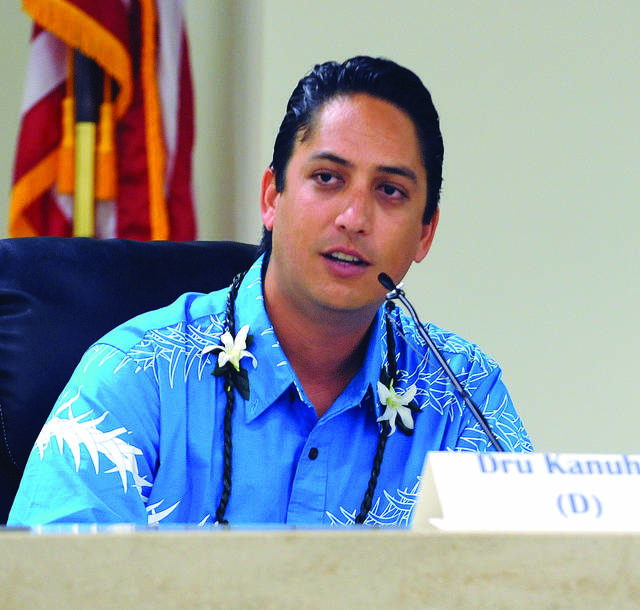HILO — Hawaii Island property owners could end up paying an extra $75 million annually if a constitutional amendment passes that would allow the state to carve off a piece of county property taxes for public education.
It’s not known which categories of properties would be taxed if the ballot amendment passes in the Nov. 6 general election.
Property classifications such as affordable housing and agriculture could fall under that category, in addition to the non-owner-occupied residential class, which already carries the highest property tax rate in the state. Preliminary indications are the state surcharge alone could increase that rate from $11.10 in tax for each $1,000 in property value to $18 per thousand.
That’s according to county Finance Department officials, who made a presentation Tuesday to the County Council Finance Committee. The $75 million increase in state taxes compares to the county’s current $524 million budget.
Counties are opposing the constitutional amendment, saying property taxes are the counties’ only dedicated revenue source. In Hawaii County, property taxes account for 76 percent of the general fund budget, said county Real Property Tax Administrator Lisa Miura.
“We struggled with the loss during the lava of $5 million (in property taxes),” Miura said. “I can’t imagine us raising $75 million.”
Hawaii has the only state-run school district, compared to other states, where schools are controlled locally and subsidized by property taxes. Hawaii’s Department of Education currently has a $2 billion budget, but students still lag behind national peers in test results, and the state is chronically short of teachers.
The Hawaii State Teachers Association has pushed for a dedicated funding source for years. HSTA President Corey Rosenlee downplayed concerns that the tax would be charged on anyone other than owners of pricey second and third homes.
“No one wants to tax mom and pop stores. No one wants to tax residents,” Rosenlee said in an interview last week. “They’re just saying that to make people afraid.”
But local officials feel they have a reason to be fearful. Not only could the county lose control over its primary revenue source, but it’s very likely its bond rating would suffer as well, Miura said. Losing control of its tax base could result in a lower bond rating and consequently, higher interest rates on county borrowing, she said.
“We can’t afford to open the door and let the state start taking county funds for state departments,” said Miura. “Once you open the door we can’t stop it.”
Kona Councilman Dru Kanuha, who’s running as a Democrat for state Senate, brought the issue up for council discussion. He said it’s a hot issue for the Hawaii State Association of Counties, and he wants to help make the public aware of the ramifications of voting for the new tax.
“We want to support our public education,” Kanuha said. “There’s issues with DOE that we don’t know where all the money’s going. … We want to see the money get directly to the classrooms but it’s not.”
Some people are calling for an audit of the department before more money is allocated, Kanuha said.
Miura agreed.
“We’re not contesting that the DOE may need more money but we’re going to explain that just throwing a blank check at them is not the answer,” she said. “The issue that we have is this does not equate with the teachers getting more pay and the kids going to get a better education in the classroom.”
Currently, the constitution states, “all functions, powers and duties relating to the taxation of real property shall be exercised exclusively by the counties.” If the ballot initiative passes, this wording will be appended, “provided that the legislature may establish, as provided by law, a surcharge on investment real property.”
The amendment further goes on to add, “Funding of public education shall be determined by the legislature; provided that revenues derived from a surcharge on investment real property pursuant to section 3 of article VIII shall be used to support public education.”
The constitutional change leaves it up to a future Legislature to set the amount of the surcharge, define what constitutes “investment real property” and detail what would qualify to “support public education.”





It’s not known which categories of properties would be taxed if the ballot amendment passes in the Nov. 6 general election.
Shining example of lousy public policy by the Liberal Hawaiian Cabal. Legislation and Constitutional amendments ill crafted without regard to unintended consequences,
Government always pushes tax plans in ways that make them look like they will impact someone else. Here they are pushing it only impacting rich, non-resident people who have no vote. Why? because there is no voting impact to them for doing so but there are hidden costs. Eventually once another taxing authority is granted, everyone will fall under it in one form or another.
We should not trust any government sanctioned tax plans put forth by big business or labor unions.
“No one wants to tax mom and pop stores. No one wants to tax residents,” Rosenlee said in an interview last week. “They’re just saying that to make people afraid.”
Bull. It STARTS with only taxing those properties; it VERY QUICKLY becomes taxing everyone’s home. Ask those who live in states that use property taxes to pay for education how well that works out for them.
DO NOT FALL FOR THIS UNION-DRIVEN SCAM!!!!
This all started with the county’s, they have not seen a tax that they do not like. Honolulu saw this and said hey 🙂 we need to get in on the act, lets start raising all of the state taxes. Income Tax is way up, TAT is way up, fees up.. and guess what there is still not enough of other people’s money! People are beginning to leave Hawaii and once a place is tarnished it rarely comes back.
Puerto Rico and Venezuela are very good examples of the path Hawaii is on. In both of these beautiful places the rich got poorer, the poor got poorer, and the government celebrated their new wealth.
If this doesn’t make you vote, nothing will !
Education is important to me. Even so, it is not the only government service that is important to me. Granting a single service exclusive access to a major source of tax revenues does not sound right to me.
I would feel this way even if it were guaranteed that more funding directly equaled better education results, but sadly that’s far from being established. Given that this measure is a union exercise of political power — managed by the union on behalf of its members, all of whom are teachers and none of whom are students — It seems at least as likely that large portions of the money would be siphoned off for union benefit vs. student benefit.
It really is all about the students. If teachers are suffering then so will their students. If teachers are prospering so will their students. Unions support teachers. So should you, if you claim that education is important.
It’s not surprising that the same “slippery slope” argument used throughout the nation by tax opponents is surfacing here.
Several years ago a state income tax proposal was advanced in WA state that would apply only to high income earners and was largely favored by those same high income earners. But regular people bought the “slippery slope” argument advanced by a professional anti tax crusader and defeated the proposal. The result was higher property taxes for everyone.
I’m not clear about what’s not clear about “income real property.” Seems pretty clear.
It’s also clear there are people in this discussion who ascribe to the notion “you can’t trust government” yet sit back and complain rather than actively support solutions to real problems.
Think they are only going to tax property once “income” is made on it? Its not income property unless it produces rental income (already taxed) or is sold (already taxed). Whats next, do you want to charge a tax on “income real investments” before that investment produces a profit? Picking one group or class to tax for this or that with no relation to anything will eventually lead to everyone paying more taxes than needed for everything. Letting unions make laws regarding taxation of schools is the equivalent to giving a fox keys to the hen house.
Sure, we like to imagine that “investment real property” is owned by a a bunch of fat cat off-island millionaires and billionaires, but a lot is owned by on-island residents who may own a second property rent it out, often to local families who cannot afford to own a home. These additional taxes will be passed on directly to local families who rent.
So could/would some affordable housing and ag properties possibly be subject to higher “investment real property” taxes, then?
The phrase in the article is “investment real property” and what is unclear about that is that essentially all real property is an investment. If push comes to shove I am not sure there is any long term defensible difference between “investment real property” and “real property.”
Interesting that Washington State has such a thriving economy and more people moving there than moving away. Maybe its the weather (I doubt that) it is probably the zero state income tax and reduced government that people find attractive.
I hope you are wrong that people here just complain and sit back do nothing. The problem is that there are a lot of people in Hawaii who do not make decisions they have only voted for democrats their entire life and say yes to every tax they hear about there are also a lot of people who have ruined places like California then abandon the state to come here and apply the same ideas. It is also an up hill battle notice that West Hawaii today took this story off the front page of their web site. There was clearly a lot of interest here as you can see from the response to your posting.
Finally, someone who actually understands this issue. Agree that much misinformation being used by the anti-tax crusaders who in this case includes the Counties.
Looks like its time to kill the unions!